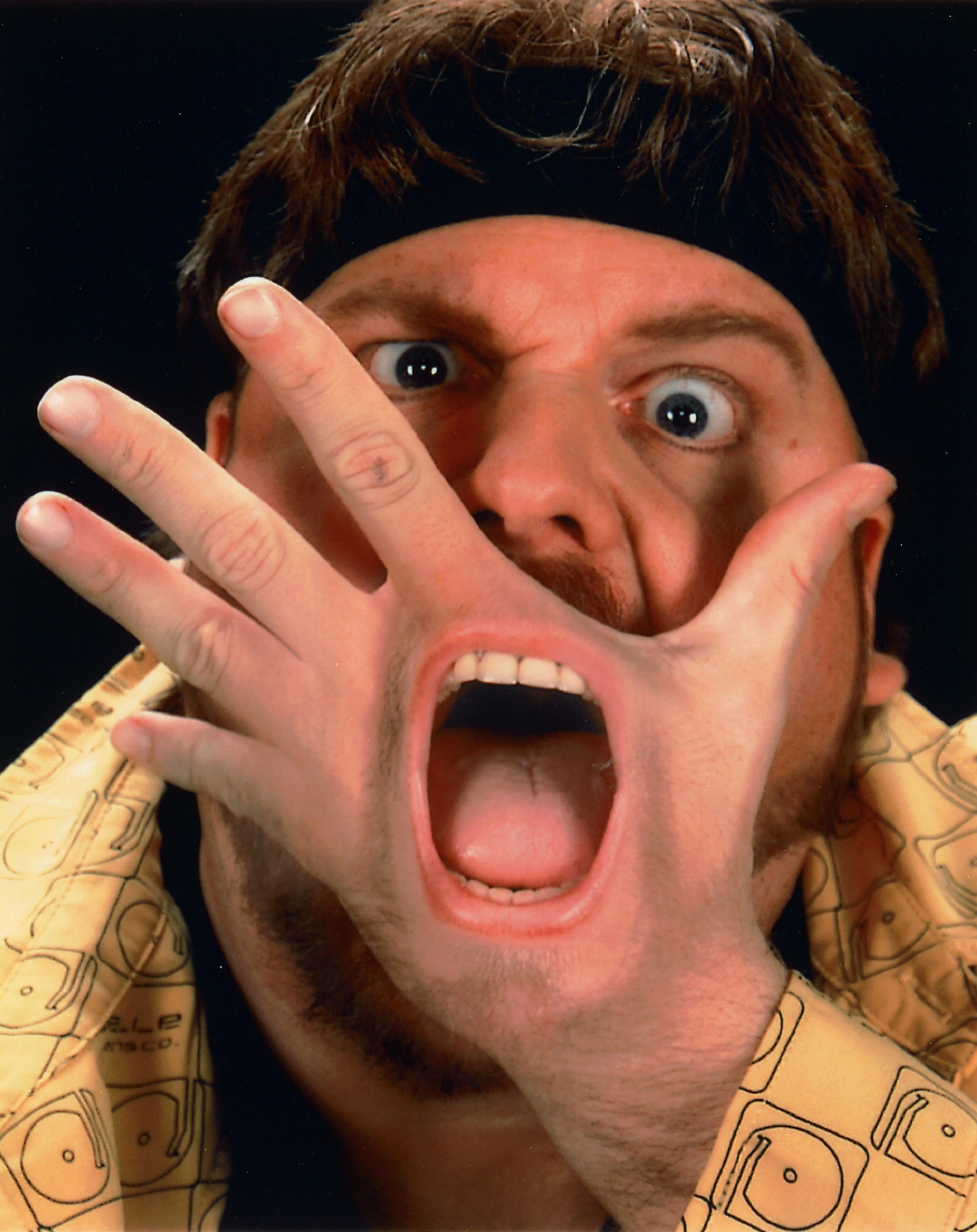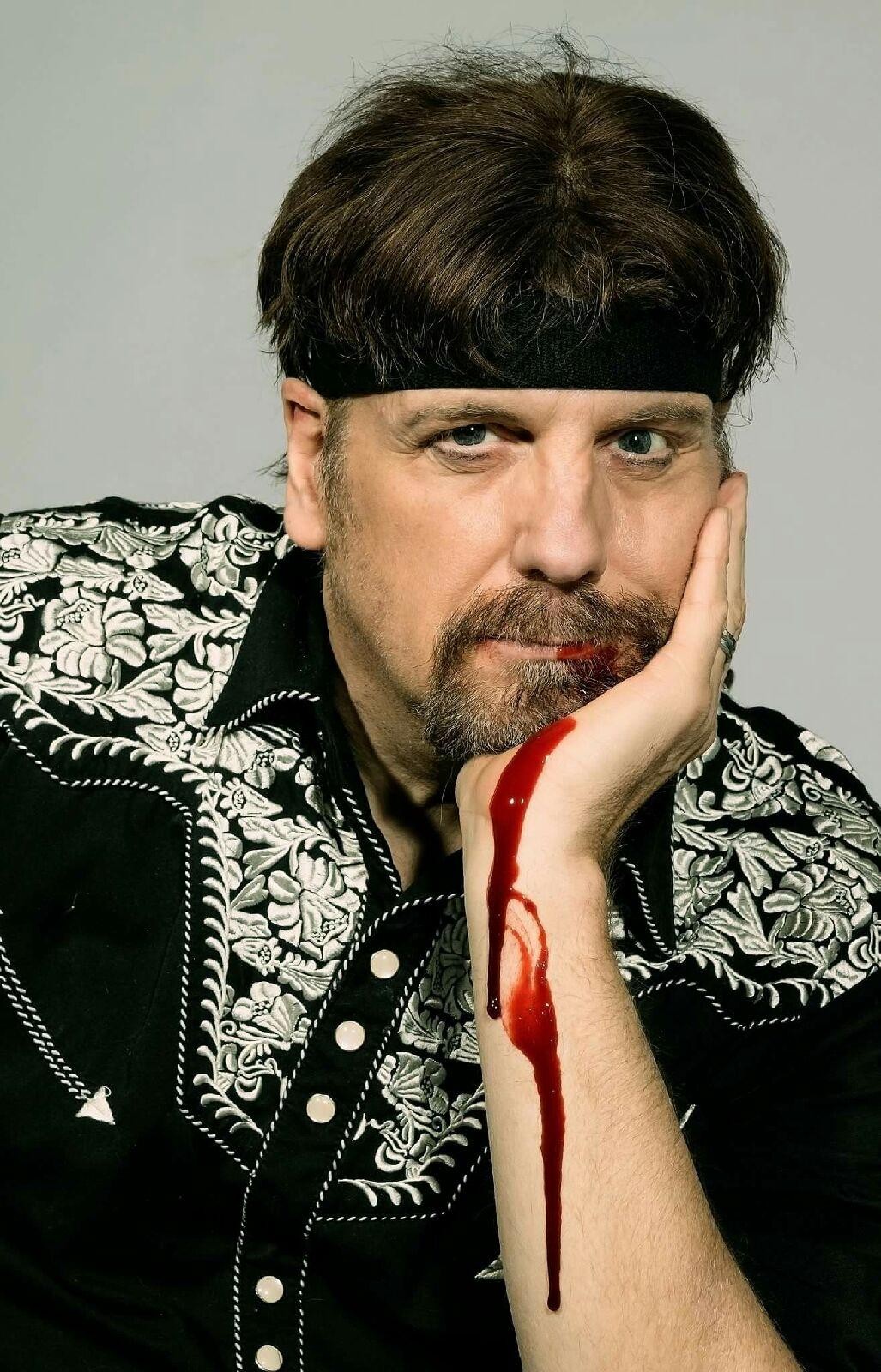 Young people may not know it but John Edward Szeles, better known as The Amazing Johnathan, was red hot during the 1980s and ’90s, parlaying a comedy/magic act honed on the streets of San Francisco into appearances in clubs across the country, on television as a guest, game show host and one-hour special star and as a headliner for 13 years in Las Vegas, where he still lives with his wife and daughter.
Young people may not know it but John Edward Szeles, better known as The Amazing Johnathan, was red hot during the 1980s and ’90s, parlaying a comedy/magic act honed on the streets of San Francisco into appearances in clubs across the country, on television as a guest, game show host and one-hour special star and as a headliner for 13 years in Las Vegas, where he still lives with his wife and daughter.
But for all of the 58-year-old Detroit native’s accomplishments, he also endured substance abuse issues, a serious heart condition and starts and stops to his career. During a brutally honest interview with Marc Maron on the July 14, 2014, WTF podcast, A.J. vowed to soldier on despite the ravages of acid, coke, speed and a bum ticker. Three months later, he stunned a Vegas audience by announcing his retirement. Now The Amazing Johnathan is back this weekend at the Brea Improv.
OC Weekly: Based on the audience feedback you get today, about what percentage of people are aware of how huge you once were?
The Amazing Johnathan: I get three generations of fans, which is kind of confusing; they are all just fans to me. But when I dissect it, yeah, I get people who say they used to watch me when they were little and would have to sneak around their parents to watch my special. Longevity has its merits. You get senior discounts.
When you took up residency in Vegas, I remember that being pretty unique at the time. It was long before Celine Dion and Elton John did that and long after the Rat Pack.
It was very rare. I have had so many lifetimes; it seems like I’ve lived three lives. There were a lot of heydays. Just when I thought it was all over, Comedy Central calls me after 12 years to do an hour special. My 13 years here in Vegas is a story in itself. There were a lot of ups. Now there seems to be another one happening. I not only thought I wouldn’t work again, I thought I would not be here. It’s a whole new stretch; I got a couple extra years. Instead of lying in bed waiting to die, I’m back at it.
How do you look back at the Vegas period, do you miss it?
Yeah, I do miss it. It’s a whole different game now. You hear people say they came in when the mafia was here and it was great. I came in at the right time, and I left at the wrong time. The first eight years were great. I first came in filling in for David Brenner for two weeks. I killed so they wanted me to stay on for two more weeks, then two years. It was always two-year renewals, and then I moved to different casinos. Those first years I made enough money to last the rest of my life. They really took care of me. I could sign for whatever I wanted. I made millions a year and lived off the money from t-shirt sales. I just stuck the big money checks in the bank. A lot of times I lived in the casinos. I’d take the elevator down to work. It was the best gig I ever had. A lot of stars would come see you, George Carlin, Kevin Spacey, all these great celebrities. I thought, “Wow, this is the best.” I was not moving around, I was not touring. I got so sick of touring I was ready to quit. Then Vegas came along and I did not have to tour anymore. It was great.
And then the bottom dropped out of Vegas. Everyone took a big hit when the recession came around. Most shows closed; they are still closing. You don’t see [entertainers on] billboards anymore. Now it’s just DJs and lawyers. I think DJs took over the town.
 There is low overhead with DJs.
There is low overhead with DJs.
I couldn’t afford to play here now if I wanted to. I saw sell outs every night, 600 every night. It was 100 every night the last few years. Then I got sick. I thought going out on the road after Vegas, the first thing I was going to be was a huge headliner. But nobody knows who you are. Vegas was a black hole. A new generation of fans is what I am dealing with now.
I would think your act appeals to all kinds of people, so you’d have a better chance than other comics in attracting new fans.
It is a timeless act. I do not talk about politics, just stupid shit. And people like stupid shit.
When you started out, were you planning to be a straight up magician or was comedy always going to be a part of it?
When I was in high school, I was thinking magician. But I was so bad that I had to stop. The last time I did magic seriously every trick went wrong in front of everyone I knew. I went from Detroit to San Francisco and saw street performers. That’s how I learned how to do comedy. Everyone on the street, like even Harry Anderson, took me under their wings and showed me stuff until I got pretty good at comedy. At magic? Never.
I don’t know, that trick you used to do carving a blade into your arm as blood squirted out was pretty amazing. Sorry.
That’s OK.
The memory of that trick still makes me wince.
I do the tricks I do well. I hang out with magicians. I like magicians. I got a lot more proficient at comedy being the host at a strip bar in the Alaska pipeline heyday. They would heckle me every night, and I got better and better really quick. I learned the ability to be witty instead of just memorizing stuff.
How does someone from Detroit wind up performing on the streets of San Francisco?
I started street performing there. I loved it a whole summer on the streets, then I went back home. I think everyone goes back home. I was still 19. I didn’t like it, so I went back to San Francisco and stuck with it. I did comedy clubs all over the U.S. One club owner took me to LA, and that’s where it started to happen: HBO Young Comedians, Jimmie Walker’s show, Thicke of the Night, Letterman. All these shows wanted me on. The timing was right. I was a high energy variety act.
Now there are no variety shows, although they keep talking about bringing them back.
There still are not any. There are not any shows that make great standups either.
Netflix has comedy specials with standups I’ve never heard of.
I was on Netflix until they started putting all this comedy on. I was like, “What the fuck?” Now someone is making a documentary on me. I just watched a rough cut of it. It’s the next big thing for me. It is made by a team with two Academy Awards for Man on a Wire and Searching for Sugar Man [reportedly headed up by producer Simon Chinn]. It will end up on Netflix, of course. That is going to be really good for me. I have not done a lot of TV. I want to get back on TV.
Did they want to make a film about you because of the Marc Maron podcast?
I don’t know how they heard about me, probably from Marc Maron. Two teams are making documentaries, one finished already and one is just putting stuff together. They have to wait a year until the other one is released. I think me being sick had everything to do with it. Announcing my retirement then working for three years while battling a heart condition is newsworthy.
Do you draw a connection between your past substance abuse and the health problems?
Oh, I’m sure there is some kind of link to it, yeah. Doctors didn’t directly link it to that. They said it could be a virus I had when I was small because my heart is all scarred up. I had a heart attack and didn’t know. They said it looks like my left wall is not beating, then it was at 12 percent at one point. I couldn’t walk anymore. Then I got better, despite the substance abuse, and they don’t know why. They said whatever I was doing to keep doing it. I don’t know the implications of that. It’s like they started the disco ball turning again. I feel pretty good, but I get tired really quickly. After 10 minutes I am exhausted.
How did you first find out you were sick?
I had a friend in Detroit who was a doctor that got this new x-ray full body scan, and he asked me if I wanted to try it out for free. I went in and then I saw the look on his face. He’s like, “We’ve got to talk. Your heart is enlarged to the size of a race horse’s. Are you on coke right now?” I underwent more tests and they saw that I had cardiomyopathy. With drugs you can control it, but it is very dangerous. I think it got worse because when I was in a car accident four or five years ago, my chest hit the steering column. I think the shock damaged the wall even more. After that I was really out of breath. I couldn’t do stairs. It was three years of hell. I was not walking anymore; the nerve damage was so painful I wanted to kill myself. I had to take 18 pills a day so I wouldn’t fall down. Sometimes I’ll faint. Passing out is the worry for me because I can be standing there and just drop like a rock. I’ve hit my head a few times, but I’ve been lucky. I have no control over that shit, you know? Medication has things pretty balanced out.
Enough of that shit: Tell us, without giving too much away, what the Brea audiences are in for.
Well, it’s really the same act. I am not saying that in a bad way. There is some new material, but it’s the same. The pacing is a little slowed. I used to move around so fast like a madman. Now I take my time with it. I savor more, ad lib more. It’s an unusual show: There are more laughs per second than in any other show.
Everyone comes up to me and says it is just as funny as it was back then. For me to be through what I went through, to hear that is cool.
THE AMAZING JOHNATHAN AT BREA IMPROV, 120 S. BREA BLVD., BREA, (714) 482-0700; BREAIMPROV.COM. FRI., 7:30 AND 9:45 P.M.; SAT., 7 AND 9:15 P.M.; SUN., 7 P.M. $25.

OC Weekly Editor-in-Chief Matt Coker has been engaging, enraging and entertaining readers of newspapers, magazines and websites for decades. He spent the first 13 years of his career in journalism at daily newspapers before “graduating” to OC Weekly in 1995 as the alternative newsweekly’s first calendar editor.

